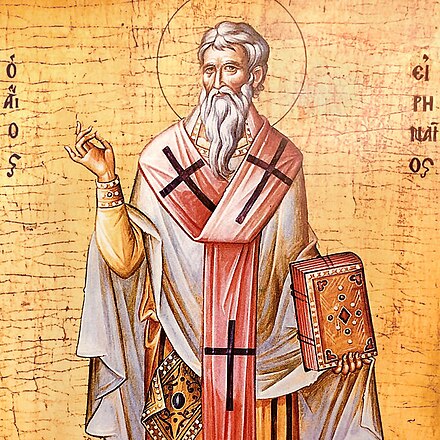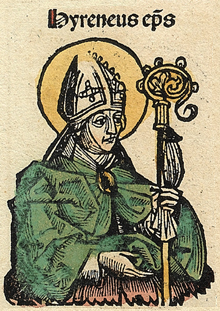
Catholic Saints
Saint Irenaeus, a second-century bishop & Doctor of the Church, was born around 130 AD, likely in Smyrna (modern-day Turkey). A disciple of Saint Polycarp, who was taught by the Apostle John, Irenaeus bridged apostolic tradition & early Christian theology. As Bishop of Lyons, he fiercely opposed Gnosticism, a heresy distorting Christian truth with dualistic myths. His seminal work, Against Heresies, defended the Incarnation & Scripture’s authority, emphasizing God’s unity and creation’s goodness. Irenaeus famously wrote, “The glory of God is man fully alive,” highlighting humanity’s divine purpose. Martyred around 202 AD, his legacy continues to shape Christian thought.
Pope Francis gave him the title "Doctor of Unity" in 2022.
Doctor of Unity
Born around 130 AD in Smyrna, Saint Irenaeus emerged as a towering figure in early Christianity, bridging the apostolic age with the developing Church of the second century.
Irenaeus hailed from the vibrant city of Smyrna in Asia Minor, a hub of trade and culture under Roman rule. As a young man, he sat at the feet of Polycarp, the venerable bishop who had been mentored by the Apostle John himself. This connection to the apostles shaped Irenaeus’s deep reverence for tradition and truth.
Later, he journeyed westward to Lugdunum—modern-day Lyon, France—where Christianity was taking root amid a sea of paganism. His early life laid the foundation for a career devoted to defending the faith against emerging threats.
Under Polycarp’s guidance, Irenaeus absorbed the teachings of Christ as handed down from the apostles. This education instilled in him a fierce commitment to preserving the purity of Christian doctrine, a mission that would define his legacy.
As bishop of Lyons, Irenaeus stepped into leadership during a time of crisis, guiding his flock with wisdom and fostering unity across the Church. In 177 AD, the Christian community in Lyons faced brutal persecution under Emperor Marcus Aurelius. After the martyrdom of Bishop Pothinus, Irenaeus was chosen to lead. His steady hand brought stability to a shaken church.
Beyond his diocese, Irenaeus played a key role in resolving disputes, such as the Quartodeciman controversy over Easter’s date. His diplomatic approach earned him a reputation as a peacemaker, uniting East and West in shared faith.
Rather than fueling division, Irenaeus sought common ground, arguing that minor differences in practice should not fracture the Church’s unity. His letters to Rome reflect a pastor’s heart committed to reconciliation.
Irenaeus’s pen became a sword against heresy, most notably in his monumental work, Against Heresies, which dismantled Gnostic distortions of the Gospel.
Gnosticism, with its secret knowledge and rejection of the material world, threatened to unravel Christian truth. Irenaeus’s five-volume Adversus Haereses exposed its flaws, rooting Christian belief in the teachings of the apostles.
He championed apostolic succession—bishops tracing their authority back to Christ’s disciples—as a safeguard against false doctrine. His writings also affirmed the unity of the Old and New Testaments as God’s single story of salvation.
By defining orthodoxy, Irenaeus gave the Church tools to discern truth from error, a legacy that endured as Christianity grew.
Irenaeus offered a profound vision of salvation, seeing Christ as the one who ‘recapitulated’ humanity’s story, redeeming it through His life and death.
His recapitulation theory framed Jesus as the second Adam, restoring what was lost in Eden. He also defended the four Gospels—Matthew, Mark, Luke, and John—as the cornerstone of Christian revelation, rejecting Gnostic alternatives.
His theology embraced the Trinity, weaving together Father, Son, and Spirit in a framework grounded in Scripture and tradition.
Irenaeus’s ideas shaped the Church’s understanding of redemption and authority, influencing centuries of theological reflection.
Though details of his death around 202 AD are uncertain, Irenaeus is revered as a martyr and saint whose impact resonates to this day.
Tradition holds that he may have died for his faith, a fitting end for a life spent defending it. Honored on June 28 in the West and August 23 in the East, he is a Father of the Church.
His writings and example continue to inspire, offering timeless lessons in fidelity and unity.
Irenaeus’s legacy as a bridge between apostolic roots and the Church’s future endures in Christian liturgy and theology.
Living in the second century, Irenaeus navigated a world of Roman persecution and theological upheaval, helping Christianity find its voice.
His journey from East to West mirrored the Church’s expansion, making him a vital link between Greek and Latin traditions.
Today, his emphasis on Scripture, tradition, and unity speaks to a fractured world seeking truth.
Irenaeus’s life reflects a pivotal era, his work a cornerstone for the faith’s growth and resilience.
“The glory of God is man fully alive, and the life of man is the vision of God.”
Born in Smyrna (modern-day Izmir, Turkey).
Irenaeus was born into a Christian family and was a disciple of Polycarp, who was a disciple of the Apostle John.
Irenaeus traveled to Gaul (modern-day France) to spread Christianity and became a priest in Lyon.
Became a priest in Lyon.
Became Bishop of Lyon.
Irenaeus succeeded the martyred Bishop Pothinus and worked to strengthen the Christian community in Lyon.
Irenaeus wrote "Against Heresies," a significant work refuting Gnosticism and defending Christian orthodoxy.
Authored "Against Heresies."
Death of Saint Irenaeus.
Irenaeus is remembered as a key figure in early Christianity, contributing to the development of Christian theology and the New Testament canon.

For as it was not possible that the man who had once for all been conquered, and who had been destroyed through disobedience, could reform himself, and obtain the prize of victory; and as it was also impossible that he could attain to salvation who had fallen under the power of sin — the Son effected both these things, being the Word of God, descending from the Father, becoming incarnate, stooping low, even to death, and consummating the arranged plan of our salvation…
Saint Irenaeus Quotes
“As I have already observed, the Church, having received this preaching and this faith, although scattered throughout the whole world, yet, as if occupying but one house, carefully preserves it. She also believes these points [of doctrine] just as if she had but one soul, and one and the same heart, and she proclaims them, and teaches them, and hands them down, with perfect harmony, as if she possessed only one mouth.”
For He did not set us free for this purpose, that we should depart from Him (no one, indeed, while placed out of reach of the Lord's benefits, has power to procure for himself the means of salvation), but that the more we receive His grace, the more we should love Him. Now the more we have loved Him, the more glory shall we receive from Him, when we are continually in the presence of the Father.
“But God being all Mind, and all Logos, both speaks exactly what He thinks, and thinks exactly what He speaks. For His thought is Logos, and Logos is Mind, and Mind comprehending all things is the Father Himself.”
“For even creation reveals Him who formed it, and the very work made suggests Him who made it, and the world manifests Him who ordered it. ”